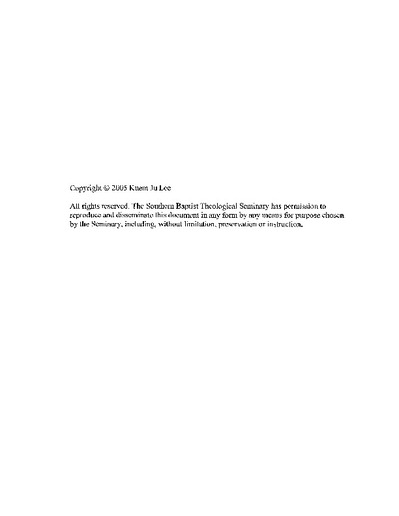Bible storying: A recommended strategy for training church leaders in oral societies
Subject
Bible stories--Study and teaching.Storytelling--Religious aspects--Christianity.
Oral communication.
Clergy--Training of.
Abstract
This dissertation identifies three countries where the Bible storying strategy has been utilized for training local church leaders. Chapter 1 introduces and defines chronological Bible storying and the need for it in oral-society leadership training. An acknowledgment of requiring a new methodology for training oral communicators has produced chronological Bible storying. A concise discussion of study's purpose and an explanation of the dissertation's methodology conclude this chapter.
Chapter 2 identifies oral communicators. First, the researcher examines oral-society cultures--their learning and teaching styles--concentrating on Southern Sudan, the Southern Philippines, and Orissa State of India. Furthermore, this chapter examines the qualities that leaders possess in oral societies. Moreover, this chapter shows the extent of oral communicators around the world, especially in those three areas. Chapter 2 proves the need for story-format-training materials with identifying culture and characteristics of orality.
Chapter 3 presents the history of Chronological Bible storying, and examines missionaries changes to Chronological Bible storying. This chapter touches on various mission fields, but it focuses on Southern Sudan, the Southern Philippines, and Orissa State of India. The beginning of the development process is explored, such as the Chronological Bible Story Teaching approach, Chronological Bible Telling materials, Chronological Bible storying.
Chapter 4 addresses the currently applied Bible storying approaches for oral communicators in the countries mentioned. After method's goal is examined and the materials are described, the viability of each material as a leadership-training strategy is evaluated. The chapter includes the results of employing the Bible storying method in the three countries.
Chapter 5 analyzes the principles and practices used in the countries, and the recommended principles and practices of the Bible storying method. The chapter explains the common principles that are successful practices used in the focused areas. A Bible storying strategy is suggested for training the local leadership that incorporated the rapid church-planting movement. This chapter seeks effective principles and practices commonly employed in the focused areas as well. It concludes with a brief suggestion, and furnishes recommendations for further study of Bible storying for preparing local leaders in oral societies.

